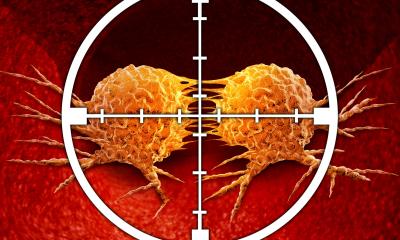
© NCT Heidelberg/Philip Benjamin
News • Health economics
Why certified cancer centers are worth the extra input
Quality assurance in cancer medicine has a reputation for being expensive and involving considerable outlay. For the first time, a cost-effectiveness analysis has now shown that patients treated in certified cancer centers not only survived longer than patients in non-certified hospitals, but also cost less, despite the greater resource commitment required.

Image source: Shutterstock/Numstocker
This was established by health economists from the German Cancer Research Center (DKFZ) in collaboration with health services researchers from TU Dresden, taking colon cancer as an example. Their study shows that the cost and effort associated with certifying cancer centers is more than offset by the enhanced efficiency of patient care: treating colon cancer patients in certified centers is likely to improve their prognosis without placing any additional economic strain on the health system.
The underlying research has been published in the International Journal of Cancer.
In the first decade of the 21st century, a multi-level model of oncological care structures was established in Germany in an effort to improve medical care for cancer patients. This model is based on Organ Cancer Centers specializing in a particular kind of cancer (Cs). The second level consists of Cancer Centers (CCs), which are certified to treat several tumor entities. In addition, there are also Comprehensive Cancer Centers (CCCs) certified by German Cancer Aid, which are attached to university hospitals and combine multidisciplinary care for patients suffering from a very broad range of cancers with research and development of new cancer treatments.
"All certified centers have to meet quality criteria such as the obligation to follow treatment guidelines or to organize tumor conferences," emphasized Jochen Schmitt from TU Dresden. "However, additional costs are incurred at the certified centers due to the higher quality of care. Above and beyond the standard care financed by the statutory health insurance system, these centers provide extensive additional services, for example in connection with implementing guidelines, psycho-oncologic counseling for patients, special consultation clinics and extended advisory services, training and continuing education, and regular tumor conferences and quality circles," explained Michael Schlander, head of Health Economics at the DKFZ. "But up to now, the cost-benefit ratio of the higher-input care in these centers has not been studied in Germany."
This was the topic addressed in the extensive cost-effectiveness analysis now published by Schlander, Schmitt, and coworkers in a partnership between the DKFZ, the Center for Evidence-Based Healthcare at TU Dresden, the statutory health insurance provider AOK Plus, and NCT/UCC Dresden (a joint institution comprising the DKFZ, Dresden University Hospital, TU Dresden, and the Helmholtz-Zentrum Dresden-Rossendorf). Chih-Yuan Cheng and his fellow health economists at the DKFZ used the pseudonymized data of a total of 6,186 patients treated either in certified centers (Cs, CCs, CCCs) or in non-certified institutions. The patients were insured with AOK Plus and had been diagnosed with colon cancer between 2008 and 2013.
The result shows that introducing certified cancer centers was the right thing to do and an important step, both for the patients and for the German health system
Michael Baumann
After Jochen Schmitt's team of researchers at TU Dresden and NCT Dresden had already demonstrated survival benefits for patients who were treated in the certified cancer centers, Michael Schlander's research team at the DKFZ subsequently determined the patient-related net costs of treatment and calculated the ratio of these costs to the patients' mean survival time. For the patients treated in the certified centers, they added the costs of the additional services associated with certification that are not covered by regular financing. This enabled the additional costs per extra year of life to be calculated and compared. The results consistently showed that patients treated in certified centers had a longer survival time – along with lower costs per patient. Even after the calculations had been examined on the basis of different assumptions, the result remained consistent.
"We were thus able to find evidence for the first time that patient care in certified Organ Cancer Centers (Cs), Cancer Centers (CCs), and Comprehensive Cancer Centers (CCCs) – which is generally regarded as being expensive – can be very attractive in terms of health economics too: not only because patients survive for longer, as already shown by Jochen Schmitt and his team in Dresden, but also because the overall costs for the health system are lower," remarked Michael Schlander. However, he stressed that the results were valid for the German health system and could not necessarily be transferred to other systems or other types of cancer.
"The result shows that introducing certified cancer centers was the right thing to do and an important step, both for the patients and for the German health system," commented Michael Baumann, Chairman of the DKFZ. "Greater use of certified cancer centers and increased networking between these institutions could allow cancer patients to benefit even more from the advantages of quality-assured care in line with guidelines in future."
Source: German Cancer Research Center
20.07.2021





